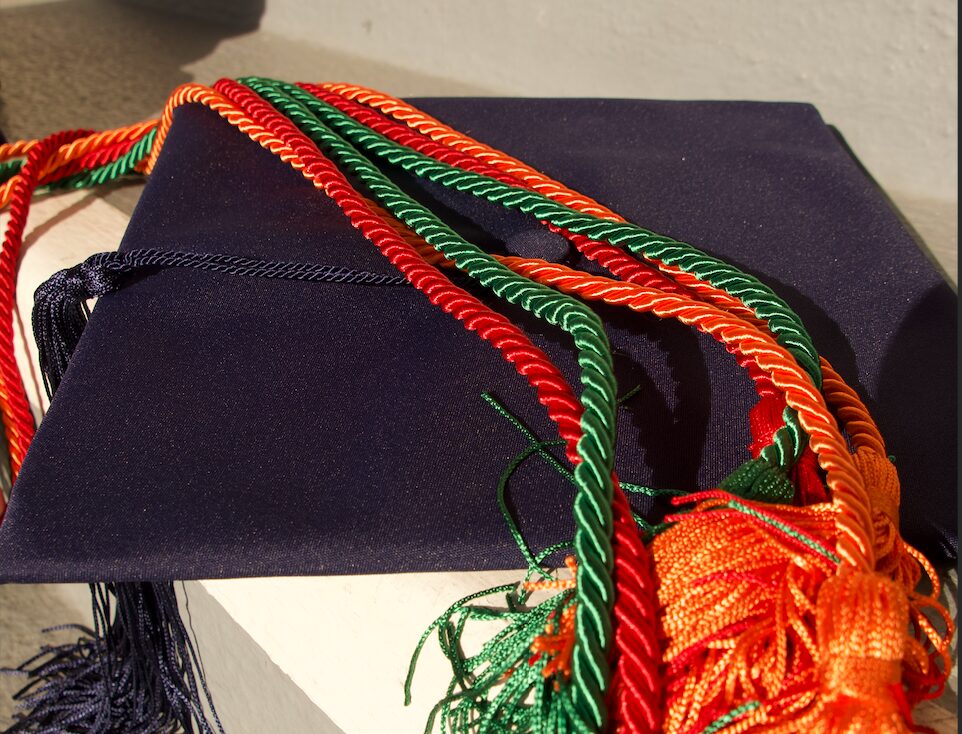Decision on stoles reflects University’s core values
4 min read
Students receive graduation cords for their involvement in clubs and leadership on campus. | Abbey Magnet, The Weekly Ringer
Martina Pugh
Staff Writer
On Feb. 22, the University Faculty Council approved a change in stole regulation, allowing students to wear up to two stoles at graduation, as well as expanding the types of official stoles included in the University’s graduation regalia.
Previously, Honors Program students and first-generation students were permitted to wear one stole for their respective academic accomplishments, which meant they had to choose which parts of their identity they felt deserved to be showcased.
There was an inherent hypocrisy within the previous regulations, as the University pridefully encourages a holistic view toward students inside and outside the classroom. However, the restriction on stoles suggested that accomplishments outside of the Honors College and being first-generation were not entities warranting such recognition.
Students could have gotten their degrees from any institution, but they chose UMW and their individual experiences are what make UMW the place it is and will continue to be. For that reason, the change in stole regulation is a step in the right direction for UMW and how it celebrates its students.
Individuals within the Student Government Association, NAACP, Class Council and the Campus Programming Board voiced their beliefs that stoles should be more accessible to the student body as a representation of what they have been able to accomplish beyond academia. The University’s rigid guidelines on regalia before the change often enforced an uncomfortable sense of uniformity that shoehorned individuals into boxes that the University usually praises them for dismantling.
UMW Class President and junior political science major Shadwick Yoder said that the previous restrictions on stoles were “another one of those tight regulations.”
He continued, “That is out of character for UMW because you are supposed to be individual and express yourself and all of these very good aspects and attributes of a liberal arts education.”
With this new freedom, commencement will be more about “all that you were able to do and accomplish as a student here because of the support of faculty and staff,” said Nathan Francis, a senior political science major.
SGA President Jaylyn Long, a senior biomedical science major, said “UMW is also a place of individuality. And so I don’t think any of my peers would be upset or frustrated if I looked like an individual because I had individual experiences.”
When asked about the importance of stoles as opposed to cords, Long, said, “I want an identifiable marker that says I’m more than just a name on a card. I am a student. I have had a lived experience here. I have had many accomplishments”
Currently, the change has been implemented; however, there is still a lack of information present on the website regarding how individuals and their organizations will obtain stoles not offered by Mary Washington.
There are multiple routes the University could take that would help streamline the process of students finding stoles for their respective organizations, such as a resource list for students to find and acquire stoles for their organizations. Other institutions, such as Christopher Newport University, refer students to specific sites, while Virginia Commonwealth University provides students with direct access through their Barnes and Noble bookstore connection.
Additionally, Mary Washington has over 100 clubs and organizations, and it would be overwhelming to expect them to create individual stoles for all of them. However, the University should fund the creation of specific stoles for elected officials for students who acquired positions through campus-wide elections.
Students who engage in activities outside of academia spearhead the institution’s ability to be considered a well-rounded environment. There is no student life on campus without students to facilitate it, and the university should be proud that students who have chosen to volunteer, create events, or work for the university want to showcase pride in their experiences.
The change in regalia comes just in time for the class of 2024 to showcase all they have accomplished at graduation on May 11—despite their pandemic-altered college experience. The decision to expand the regalia that graduating students may don is a step in the right direction, for the work that students do during their undergraduate careers deserves to be recognized as they walk across the stage to receive their diplomas.
“I think that sending us off in a way that we feel like we have celebrated what it is that we have been able to accomplish while we were here is deeply important to graduating seniors and I think would make for stronger alumni,” said Jenny Wolfe, a senior political science major.


